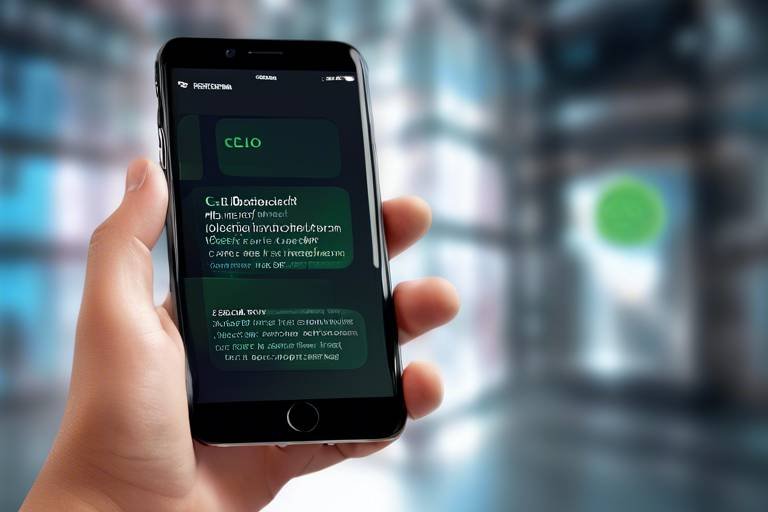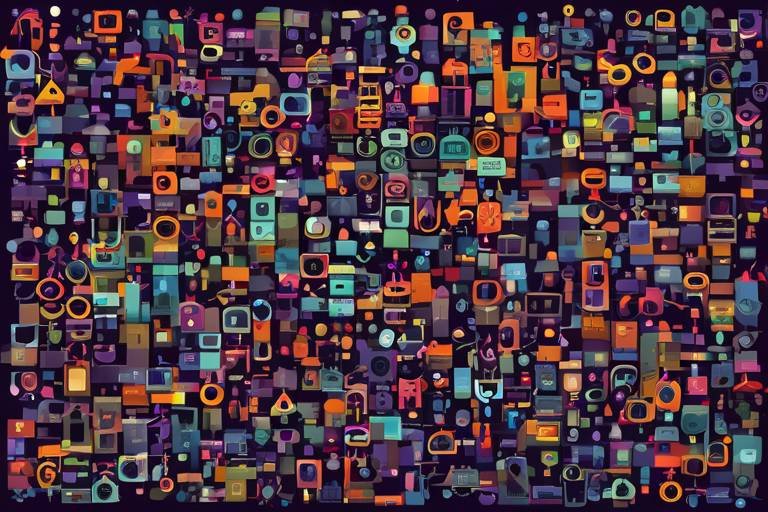Sora - Decentralized Economic System Explained
The Sora decentralized economic system is a groundbreaking approach to reshaping how we think about finance and community engagement. Imagine a world where economic power is not concentrated in the hands of a few, but rather distributed among the many. This is the essence of Sora. By leveraging the principles of decentralization, Sora seeks to create an economic environment that is not only fairer but also more transparent and efficient. In this article, we will delve into the intricate workings of Sora, exploring its principles, mechanisms, and the potential impact it can have on the global economy. Buckle up, because understanding Sora might just change the way you view economic systems forever!
Decentralization is not just a buzzword; it’s a fundamental principle that lies at the heart of the Sora economic system. But what does decentralization really mean? Essentially, it allows for distributed control and decision-making, empowering users rather than central authorities. Think of it like a potluck dinner where everyone brings a dish to share. No one person is in charge of the meal, and everyone has a say in what’s served. This model enhances transparency and trust among participants, as decisions are made collectively rather than dictated from above.
In the Sora ecosystem, decentralization means that every user has the power to influence the direction of the platform. This not only fosters a sense of community but also encourages active participation. The more people engage, the stronger the network becomes. It’s a beautiful cycle of empowerment and collaboration that can lead to innovative solutions to economic challenges.
What makes Sora stand out in the crowded field of decentralized systems? One of its defining characteristics is its innovative governance model and tokenomics. Unlike traditional economic systems, where decisions are often made behind closed doors, Sora opens the door wide for community involvement. This transparency is crucial for building trust and ensuring that the platform evolves in a way that reflects the needs and desires of its users.
The governance model in Sora is designed to facilitate community participation in decision-making processes. Imagine being part of a committee where your voice truly matters. In Sora, users can influence policies and developments within the ecosystem, fostering a sense of ownership and responsibility. This participatory approach not only empowers individuals but also leads to more thoughtful and inclusive decision-making.
Voting systems are integral to Sora's governance. They ensure that all stakeholders have a voice in shaping the platform's future. The mechanics of voting can vary, but they typically include mechanisms like weighted voting, where the influence of a vote may be determined by the number of tokens held by a user. This approach balances the interests of smaller participants with those of larger stakeholders, ensuring a fair representation of all voices.
Another essential aspect of Sora's governance is the proposal process, allowing community members to suggest changes or improvements. It’s like a suggestion box that is taken seriously! Proposals are submitted through a transparent mechanism, evaluated by the community, and implemented based on collective agreement. This not only enhances engagement but also ensures that the platform evolves in a way that meets the needs of its users.
Sora’s tokenomics play a crucial role in incentivizing participation and resource allocation. In a nutshell, tokenomics refers to the economic models that support the network's sustainability and growth. Sora utilizes its native token to facilitate transactions, reward users, and fund development projects. This creates a vibrant economy where users are motivated to contribute actively, knowing that their efforts will be rewarded.
So, why should anyone care about Sora? The benefits are numerous and compelling. Imagine a system that not only increases efficiency but also reduces costs and enhances accessibility. Sora aims to transform economic interactions for users globally, making it easier for everyone to participate in the economy.
By leveraging decentralized technology, Sora aims to streamline processes and cut costs significantly. For instance, traditional banking systems often involve lengthy procedures and high fees for transactions. In contrast, Sora’s approach minimizes intermediaries, enabling quicker and cheaper transactions. This efficiency can lead to substantial savings for users and businesses alike.
One of the most exciting aspects of Sora is its commitment to inclusivity. The platform is designed to provide access to economic resources for underserved populations. Think of it as a bridge connecting those who have been traditionally excluded from the financial system to new opportunities. By empowering individuals worldwide, Sora promotes financial inclusion and helps create a more equitable economic landscape.
- What is Sora? Sora is a decentralized economic system designed to empower users through distributed control and decision-making.
- How does decentralization benefit users? Decentralization enhances transparency, community engagement, and trust among participants.
- What are the governance mechanisms in Sora? Users can participate in decision-making through voting systems and proposal processes.
- Why is tokenomics important for Sora? Tokenomics incentivizes participation and supports the sustainability and growth of the network.
- How does Sora promote financial inclusion? Sora provides access to economic resources for underserved populations, empowering individuals globally.

Understanding Decentralization
Decentralization is not just a buzzword; it's a revolutionary concept that underpins the Sora economic system. Imagine a world where power isn't concentrated in the hands of a few but is distributed among many. This is exactly what decentralization offers. It allows users to have a say in the economic processes that affect their lives, fostering a sense of community and collaboration. In Sora, decentralization empowers individuals by giving them control over their own economic activities, thus enhancing transparency and trust within the system.
One of the most significant advantages of a decentralized system is the elimination of intermediaries. In traditional economic systems, intermediaries such as banks and financial institutions often control transactions, which can lead to inefficiencies and increased costs. With Sora, transactions occur directly between users, which not only speeds up the process but also reduces fees. This shift from a centralized to a decentralized model can be likened to moving from a crowded highway to a scenic back road—less traffic, more freedom, and a smoother journey.
Furthermore, decentralization enhances transparency. In a centralized system, decisions are often made behind closed doors, leaving users in the dark about how their resources are managed. In contrast, Sora's decentralized framework allows for open discussions and community involvement in decision-making processes. This means that every participant can see how resources are allocated, policies are formed, and ultimately, how the economic system operates. Users are no longer passive observers; they become active participants, fostering a culture of accountability.
In Sora, decentralization is not just a feature; it’s a core principle that shapes every aspect of the ecosystem. It encourages innovation, as users are free to experiment and propose new ideas without the constraints imposed by traditional systems. This flexibility can lead to the emergence of new economic models and opportunities that might not have been possible in a more rigid structure. Just like a garden that flourishes when nurtured with diverse plants, Sora thrives on the variety of contributions from its community members.
To summarize, decentralization in Sora is about empowering individuals, enhancing transparency, and fostering a collaborative environment. It breaks down barriers, promotes inclusivity, and creates a more efficient economic system. As we delve deeper into the unique features of Sora, it becomes clear that decentralization is the foundation upon which this innovative economic model stands.
- What is decentralization? Decentralization refers to the distribution of authority, control, and decision-making away from a central authority, allowing for greater participation and transparency.
- How does decentralization benefit users? It empowers users by giving them control over their economic activities, reduces costs by eliminating intermediaries, and enhances transparency through community involvement.
- Can decentralization lead to better innovation? Yes, by allowing diverse contributions and ideas to flourish, decentralization fosters an environment where innovation can thrive.

Sora's Unique Features
Sora is not just another decentralized platform; it’s a revolutionary economic system that brings together innovative features designed to empower users and reshape how we think about finance. At its core, Sora integrates a robust governance model and a dynamic tokenomics framework, which together create a unique ecosystem that stands out in the crowded world of decentralized finance (DeFi). Imagine a world where the power is truly in the hands of the people, where decisions are made collectively, and where every participant has a stake in the game. This is the promise of Sora.
One of the most exciting aspects of Sora is its governance model, which allows users to actively participate in decision-making processes. This is not merely a theoretical concept; it’s a practical application of decentralization that fosters community engagement and responsibility. Users can propose changes, vote on important issues, and influence the direction of the platform. This level of involvement ensures that the ecosystem evolves in a way that reflects the collective interests of its members, rather than being dictated by a centralized authority.
Moreover, Sora's tokenomics is designed to incentivize participation and ensure sustainability. By creating a system where users are rewarded for their contributions—be it through governance, providing liquidity, or engaging in economic activities—Sora promotes a healthy, thriving community. For instance, the native token serves not just as a medium of exchange, but also as a governance tool, allowing holders to vote on proposals and influence the platform's future. This dual functionality is a game-changer, as it aligns the interests of the users with the overall success of the ecosystem.
To illustrate these unique features, let’s take a closer look at some of the key components:
| Feature | Description |
|---|---|
| Governance Model | Empowers users to participate in decision-making processes and propose changes. |
| Tokenomics | Incentivizes participation and resource allocation through a dual-function native token. |
| Community Engagement | Fosters a sense of ownership and responsibility among users. |
In conclusion, Sora’s unique features create a compelling case for why it stands apart from traditional economic systems. By blending decentralized governance with innovative tokenomics, Sora not only empowers its users but also paves the way for a more inclusive and equitable financial landscape. So, whether you’re a seasoned crypto enthusiast or a newcomer eager to explore the decentralized world, Sora offers a fresh perspective on economic participation and community-driven growth.

Governance Mechanisms
The governance model in Sora is not just a structure; it's a living, breathing ecosystem that empowers its community members to take an active role in shaping the platform's future. Imagine being part of a team where every voice matters, where your opinions can influence decisions that affect not just you, but the entire community. This is precisely what Sora aims to achieve through its innovative governance mechanisms. By decentralizing authority, Sora ensures that every participant has a stake in its development, fostering a sense of ownership and responsibility among users.
At the heart of Sora’s governance is the principle of community participation. Users can engage in discussions, propose changes, and vote on critical issues, making the ecosystem more democratic and transparent. This model stands in stark contrast to traditional systems, where decisions are often made by a select few, leaving the majority in the dark. In Sora, everyone has a chance to contribute, ensuring that the platform evolves according to the collective needs and desires of its users.
To facilitate this participatory approach, Sora employs a variety of governance tools and mechanisms. One of the key components is the voting system, which allows users to express their preferences on proposals and initiatives. This system is designed to be intuitive and accessible, enabling even those who are new to the platform to engage meaningfully. For instance, users can vote on proposals related to network upgrades, funding allocations, or changes in governance policies. This ensures that the direction of the Sora ecosystem is aligned with the community's vision.
Moreover, the proposal process is another vital aspect of Sora’s governance. Community members can submit their ideas for enhancements or changes, which are then evaluated by their peers. This process not only encourages innovation but also ensures that the most relevant and beneficial ideas rise to the top. The community collectively decides which proposals to implement, creating a dynamic environment where creativity and collaboration thrive. This is akin to a bustling marketplace of ideas, where the best solutions emerge through collective wisdom.
In summary, Sora's governance mechanisms are designed to promote inclusivity, transparency, and active participation. By allowing users to influence policies and developments, Sora not only enhances the overall user experience but also builds a robust community that is invested in the platform's success. This model not only empowers individuals but also strengthens the entire ecosystem, making it a beacon of decentralized governance in the modern economic landscape.
- What is the role of community members in Sora's governance?
Community members can propose changes, vote on initiatives, and participate in discussions, ensuring that their voices are heard in the decision-making process. - How does the voting system work?
Users can cast their votes on various proposals through an intuitive interface, allowing them to influence critical decisions affecting the ecosystem. - What happens to proposals after they are submitted?
Proposals are evaluated by the community, and the most relevant ones are voted on for implementation, fostering a collaborative environment.

Voting Systems
In the Sora ecosystem, are not just mechanisms; they are the lifeblood of community engagement and participation. Imagine a bustling town hall meeting where every voice matters, and decisions are made collectively. That's the essence of how Sora operates. Here, users can actively participate in shaping the future of the platform, ensuring that their opinions and preferences are heard loud and clear. This democratic approach fosters a sense of ownership among stakeholders, making them feel like they are part of something bigger than themselves.
At the core of Sora's voting systems are several innovative mechanisms designed to ensure fairness and transparency. For instance, users can cast their votes on various proposals that affect the ecosystem, from changes in governance to new features or enhancements. Each vote carries weight, and the results are publicly accessible, promoting accountability within the community. This system is akin to a digital ballot box, where every participant's choice contributes to the collective decision-making process.
To break it down further, the voting systems in Sora can be categorized into a few key types:
- Direct Voting: Users can directly vote on proposals, allowing for immediate feedback on community suggestions.
- Delegated Voting: Users can delegate their voting power to trusted representatives, ensuring that even those who may not have the time to participate can still have their voices heard.
- Quadratic Voting: This innovative approach allows users to express the strength of their preferences, giving more weight to votes on issues they care about deeply.
Each of these voting systems is designed to enhance user engagement while maintaining a balance between individual influence and collective decision-making. By employing such diverse voting mechanisms, Sora ensures that every stakeholder can find a way to participate that suits their preferences and circumstances.
Furthermore, Sora's voting systems are built on the principles of transparency and security. All voting activities are recorded on the blockchain, which means that the results are tamper-proof and verifiable. This level of transparency is crucial in building trust within the community, as users can independently verify the outcomes of votes and the integrity of the process.
In conclusion, the voting systems in Sora are not merely about casting votes; they are about creating a vibrant community where everyone has a stake in the future. By leveraging technology to enhance democratic participation, Sora is paving the way for a more inclusive and responsive economic system. So, whether you're a seasoned crypto enthusiast or a newcomer to the decentralized world, your voice matters in Sora!
- What is the purpose of the voting systems in Sora? The voting systems are designed to facilitate community participation in decision-making, ensuring that all stakeholders have a voice in shaping the platform's future.
- How can I participate in voting? Users can participate by either voting directly on proposals or delegating their voting power to trusted representatives within the community.
- What types of voting mechanisms are used? Sora employs various voting mechanisms, including direct voting, delegated voting, and quadratic voting, to cater to different preferences and engagement levels.
- Is the voting process transparent? Yes, all voting activities are recorded on the blockchain, ensuring that the results are transparent, verifiable, and tamper-proof.

Proposal Processes
The proposal process in the Sora ecosystem is a vital component that empowers community members to actively participate in shaping the future of the platform. This system is designed to be as inclusive and transparent as possible, allowing users to submit their ideas for improvements or changes that can enhance the overall functionality and experience of the Sora network. Think of it as a digital town hall where everyone has a voice and the opportunity to contribute to the community’s growth.
When a user has an idea, they can submit a proposal through the designated platform interface. The process typically involves a few key steps:
- Submission: Users draft their proposals, outlining the idea, its objectives, and potential impacts. This initial submission is crucial as it sets the stage for discussion.
- Discussion: Once submitted, proposals enter a discussion phase where community members can provide feedback, ask questions, and suggest modifications. This collaborative approach ensures that the proposal is refined and improved before moving forward.
- Evaluation: After the discussion phase, proposals are evaluated based on predefined criteria, including feasibility, potential benefits, and alignment with Sora’s goals. This evaluation is often conducted by a committee of community members who have expertise in relevant areas.
- Voting: If a proposal passes the evaluation stage, it moves to the voting phase. Community members can vote on whether to accept or reject the proposal, giving everyone a say in the decision-making process.
- Implementation: Once a proposal is approved, it enters the implementation phase, where developers and contributors work together to bring the idea to life. This collaborative effort ensures that the community's vision is realized effectively.
This structured approach not only fosters a sense of community ownership but also ensures that the best ideas rise to the top through collective wisdom. By allowing users to propose and refine ideas, Sora enhances its adaptability and responsiveness to the needs of its community. In essence, the proposal process is not just a mechanism for change; it’s a reflection of Sora’s commitment to a truly decentralized and participatory economic system.
Q1: How can I submit a proposal in Sora?
A1: You can submit a proposal through the Sora platform's designated submission interface. Make sure to provide a clear outline of your idea and its potential impacts.
Q2: What happens if my proposal is rejected?
A2: If your proposal is rejected, you can revise it based on community feedback and resubmit it during the next proposal cycle.
Q3: How long does the proposal process take?
A3: The duration varies, but typically, the entire process from submission to implementation can take several weeks, depending on the complexity of the proposal and community engagement.
Q4: Can anyone participate in the proposal process?
A4: Yes! Sora encourages all community members to participate in the proposal process, ensuring that everyone has a voice in shaping the ecosystem.

Tokenomics Explained
The tokenomics of Sora is a fascinating aspect that is pivotal to its success and sustainability. It refers to the economic model that governs the creation, distribution, and management of tokens within the Sora ecosystem. At its core, tokenomics is designed to incentivize participation and ensure that the network can grow and thrive over time. Think of it as the engine that powers the entire system, ensuring that everyone has a role to play and a stake in the outcomes.
One of the most exciting components of Sora's tokenomics is its dual-token model. This approach separates the utility and governance functions of the tokens, allowing for a more streamlined and efficient economic system. The first token serves as a utility token, enabling users to access various services and features within the Sora platform. The second token, on the other hand, is focused on governance, giving holders the power to vote on key decisions and proposals that shape the future of the ecosystem.
Moreover, the Sora network employs a unique incentive structure that rewards users for their contributions. For instance, users who participate in governance activities, such as voting or submitting proposals, are often rewarded with additional tokens. This not only encourages active participation but also fosters a sense of community and shared responsibility among users. In this way, Sora's tokenomics creates a virtuous cycle where engagement leads to rewards, which in turn drives further engagement.
Another critical aspect of Sora's tokenomics is its focus on resource allocation. The platform utilizes a system that dynamically adjusts the distribution of tokens based on demand and participation levels. This means that as more users engage with the network, the token supply can be adjusted to ensure that resources are allocated efficiently. This adaptability is crucial in a decentralized system, where changes in user behavior can significantly impact the overall health of the economy.
To illustrate this further, consider the following table that outlines the key elements of Sora's tokenomics:
| Element | Description |
|---|---|
| Utility Token | Used for accessing services and features within the Sora ecosystem. |
| Governance Token | Allows holders to vote on proposals and influence the direction of the platform. |
| Incentive Structure | Rewards users for participation, fostering community engagement. |
| Dynamic Resource Allocation | Adjusts token distribution based on user demand and participation. |
In summary, Sora's tokenomics is not just about creating a currency; it’s about building a robust ecosystem where every participant has the opportunity to contribute and benefit. By aligning incentives with active participation, Sora is paving the way for a more inclusive and efficient economic system that could redefine how we think about value exchange in the digital age.
- What are the main tokens in the Sora ecosystem?
The Sora ecosystem utilizes a dual-token model, consisting of a utility token for accessing services and a governance token for voting on proposals. - How does Sora incentivize user participation?
Sora rewards users with additional tokens for participating in governance activities such as voting and submitting proposals. - What is dynamic resource allocation?
This refers to Sora's ability to adjust token distribution based on user demand and participation levels, ensuring efficient resource management.

Benefits of Sora
The Sora decentralized economic system is not just another trend; it's a revolutionary approach that offers a myriad of benefits to its users. Imagine a world where financial transactions are not only swift but also cost-effective and accessible to everyone, regardless of their background. This is the vision that Sora brings to life. By harnessing the power of decentralization, Sora aims to create an economic environment where efficiency reigns supreme, costs are minimized, and opportunities are available to all. Let's dive into the key benefits that make Sora a game-changer in the economic landscape.
One of the most significant advantages of Sora is its potential for increased efficiency. Traditional financial systems often involve multiple intermediaries, leading to delays and increased transaction costs. With Sora, transactions are processed on a decentralized network, which means that users can enjoy faster transaction times and lower fees. For instance, consider a cross-border payment: in a conventional system, it could take days to process, but with Sora, it can be completed in a matter of minutes. This swift processing not only saves time but also enhances the overall user experience, making economic interactions more fluid and dynamic.
Moreover, Sora’s design inherently promotes cost reduction. By eliminating the need for intermediaries, Sora reduces the overhead costs that often burden users in traditional systems. This is especially beneficial for small businesses and individuals who may struggle with high transaction fees. With Sora, the money saved on fees can be reinvested into the community or used to enhance personal financial stability. Imagine a small business owner who can allocate those savings towards marketing or product development instead of paying hefty bank fees. That’s the kind of impact Sora can have!
Accessibility is another cornerstone of Sora’s benefits. In many parts of the world, individuals face barriers to accessing financial services due to geographic, economic, or social factors. Sora’s decentralized nature ensures that anyone with an internet connection can participate in the economy. This is particularly transformative for underserved populations who have historically been excluded from traditional banking systems. Sora empowers these individuals, granting them access to economic resources that can help them thrive. It’s like opening the door to a treasure trove of opportunities that were previously locked away.
Furthermore, Sora encourages financial literacy and education. The platform is designed to be user-friendly, making it easier for individuals to understand how to navigate the economic landscape. Sora provides resources and tools that help users make informed decisions about their finances. This educational aspect fosters a sense of empowerment, allowing users to take control of their financial futures. As users become more knowledgeable, they can make better choices, leading to improved financial health and stability.
In summary, the benefits of Sora extend far beyond mere convenience. By enhancing efficiency, reducing costs, promoting accessibility, and encouraging financial literacy, Sora is paving the way for a more inclusive and equitable economic system. As we continue to explore the possibilities of decentralized finance, it’s clear that Sora stands out as a beacon of hope for a brighter economic future.
- What is Sora? Sora is a decentralized economic system designed to enhance efficiency, reduce costs, and promote accessibility in financial transactions.
- How does Sora improve transaction efficiency? By utilizing a decentralized network, Sora eliminates intermediaries, allowing for faster processing times and lower fees.
- Who can benefit from Sora? Anyone with an internet connection can benefit from Sora, especially underserved populations who have limited access to traditional financial services.
- Does Sora provide educational resources? Yes, Sora offers tools and resources to help users understand the economic landscape and make informed financial decisions.

Efficiency and Cost Reduction
In today's fast-paced world, efficiency and cost reduction are not just buzzwords; they are essential for survival in any economic landscape. The Sora decentralized economic system is designed with these principles at its core, aiming to revolutionize how we think about transactions and resource allocation. Imagine a world where every transaction is seamless, and costs are minimized—this is the promise that Sora brings to the table.
One of the standout features of Sora is its ability to streamline processes through decentralization. Traditional systems often involve multiple intermediaries, which can complicate transactions and inflate costs. With Sora, the elimination of these intermediaries allows for direct peer-to-peer interactions. This not only speeds up transactions but also significantly reduces fees associated with them. For instance, consider the typical costs involved in cross-border payments. With Sora, these costs can be slashed by up to 90%, making global commerce more accessible and affordable for everyone.
Furthermore, Sora's use of blockchain technology ensures that transactions are not only faster but also more secure. Each transaction is recorded on a public ledger, which enhances transparency and reduces the risk of fraud. This level of security can lead to lower insurance costs for businesses, further contributing to overall cost reduction. In a traditional system, the need for extensive security measures can add layers of expense, but Sora flips this model on its head.
Let’s break down some of the key efficiencies that Sora introduces:
- Reduced Transaction Times: With Sora, transactions can be completed in seconds rather than days, which is crucial for businesses that rely on quick cash flow.
- Lower Fees: By cutting out intermediaries, Sora minimizes the fees associated with transactions, making it cheaper for users to send and receive funds.
- Automated Processes: Smart contracts in the Sora ecosystem automate various processes, reducing the need for manual intervention and the potential for human error.
To illustrate the impact of Sora's efficiency, let’s take a look at a simple comparison table:
| Feature | Traditional System | Sora System |
|---|---|---|
| Transaction Time | 1-3 Days | Seconds |
| Transaction Fees | 3-5% of transaction value | 0.1-1% of transaction value |
| Security | Dependent on intermediaries | Blockchain-based |
In addition to these efficiencies, Sora also focuses on resource allocation. By utilizing a decentralized model, resources can be allocated more effectively based on real-time data and community needs. This dynamic approach means that funds can be directed to where they are most needed, rather than being tied up in bureaucratic processes. Think of it like a well-oiled machine, where every part is working in harmony to achieve optimal performance.
Ultimately, Sora's commitment to efficiency and cost reduction is not just about saving money; it's about creating a more equitable economic system that empowers users around the globe. By making economic participation more affordable and accessible, Sora is paving the way for a future where everyone has the opportunity to thrive. So, if you're looking for a system that prioritizes efficiency and cost-effectiveness, Sora might just be the answer you've been searching for.
- What is Sora? Sora is a decentralized economic system that aims to enhance efficiency, reduce costs, and promote financial inclusion.
- How does Sora reduce transaction costs? By eliminating intermediaries and utilizing blockchain technology, Sora significantly lowers transaction fees.
- Is Sora secure? Yes, Sora employs blockchain technology, which provides a high level of security and transparency for all transactions.
- Can anyone participate in the Sora ecosystem? Absolutely! Sora is designed to be inclusive, allowing users from all backgrounds to engage with the system.

Accessibility for All
In today's world, **accessibility** is more than just a buzzword; it's a necessity. The Sora decentralized economic system is designed with this principle at its core, aiming to dismantle barriers that have long hindered economic participation for many individuals. Imagine a world where everyone, regardless of their background or location, has the opportunity to engage in economic activities. That's the vision Sora is working towards, and it’s not just a dream—it's becoming a reality.
One of the standout features of Sora is its commitment to **financial inclusion**. Traditional financial systems often leave out vast segments of the population, particularly in developing regions where banking infrastructure is lacking. Sora leverages blockchain technology to create a platform that is not only accessible but also user-friendly. By utilizing smartphones and internet connectivity, individuals in remote areas can participate in the global economy without the need for a conventional bank account.
Furthermore, Sora employs a unique model that allows users to access economic resources through its native token, XOR. This token can be earned, traded, and used to access various services within the ecosystem, effectively lowering the entry barriers for users. For instance, people can engage in economic activities such as trading, investing, or even voting on governance matters without needing a hefty sum to get started. This democratization of finance is revolutionary and promotes a sense of ownership and agency among users.
Additionally, Sora’s platform is designed to be intuitive, catering to users who may not have extensive technical knowledge. The user interface is simple and straightforward, allowing individuals to navigate through the system easily. This focus on usability ensures that even those who are not tech-savvy can engage with the platform confidently. As a result, Sora is opening doors for **underserved populations**, enabling them to take part in economic activities that were previously out of reach.
Another significant aspect of accessibility in Sora is its community-driven approach. By involving users in the decision-making process through voting and proposals, Sora empowers individuals to voice their needs and preferences. This not only enhances transparency but also ensures that the platform evolves in a way that truly reflects the desires of its community members. It’s a **collaborative ecosystem** where each user’s input is valued, fostering a sense of belonging and shared purpose.
In summary, Sora is not just another economic system; it’s a **transformative force** aimed at making economic participation a reality for everyone. By prioritizing accessibility, Sora is paving the way for a more inclusive global economy where individuals from all walks of life can thrive. The potential impact of this approach is profound, as it could lead to increased economic stability and growth in regions that have been historically marginalized.
- What is Sora? Sora is a decentralized economic system that aims to enhance financial inclusion and accessibility for users worldwide.
- How does Sora promote accessibility? By leveraging blockchain technology, Sora allows users in underserved regions to participate in economic activities without traditional banking barriers.
- What role does the XOR token play? The XOR token is central to the Sora ecosystem, enabling users to engage in various economic activities and governance.
- Can anyone participate in Sora? Yes, Sora is designed to be user-friendly, ensuring that individuals of all technical backgrounds can engage with the platform.
Frequently Asked Questions
- What is the Sora decentralized economic system?
The Sora decentralized economic system is a revolutionary approach to economic interactions that emphasizes distributed control and decision-making. It enables users to participate actively in governance and resource allocation, creating a more inclusive and transparent economic environment.
- How does decentralization empower users in Sora?
Decentralization empowers users by allowing them to have a direct say in the decision-making processes. This means that every participant can influence policies and developments, fostering a sense of ownership and responsibility within the ecosystem.
- What are the unique features of Sora?
Sora boasts several unique features, including its innovative governance model and tokenomics. These elements not only set Sora apart from other decentralized systems but also enhance economic participation by incentivizing users to engage actively in the network.
- How does the governance model work in Sora?
The governance model in Sora allows community members to participate in decision-making through various mechanisms, such as voting. This ensures that all stakeholders have a voice and can contribute to shaping the platform's future.
- What voting systems are used in Sora?
Sora employs multiple voting mechanisms to ensure democratic participation. These systems allow users to vote on proposals and changes, ensuring that the community's needs and preferences are reflected in the platform's evolution.
- How can community members submit proposals in Sora?
Community members can submit proposals for changes or improvements through a structured process. These proposals are then evaluated by the community, ensuring that only the most beneficial ideas are implemented within the Sora ecosystem.
- What role does tokenomics play in Sora?
Tokenomics is crucial in Sora as it incentivizes participation and facilitates resource allocation. By creating a sustainable economic model, Sora ensures that users are rewarded for their contributions, promoting growth and engagement within the network.
- What are the benefits of using Sora?
Sora offers numerous benefits, including increased efficiency, reduced costs, and enhanced accessibility. These advantages can significantly transform economic interactions, making them more effective and inclusive for users around the globe.
- How does Sora improve efficiency compared to traditional systems?
Sora leverages decentralized technology to streamline processes and cut costs. By eliminating intermediaries and reducing transaction times, Sora enhances overall efficiency, making economic interactions faster and more reliable.
- How does Sora promote financial inclusion?
Sora is designed to be accessible to all, particularly underserved populations who may lack access to traditional financial systems. By providing economic resources and opportunities, Sora empowers individuals worldwide, fostering greater financial inclusion.



















